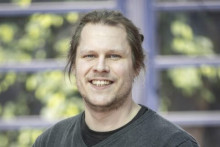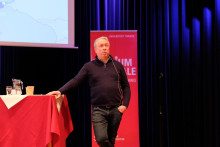In light of Russian’s ongoing war on Ukraine, pleas for increasing military collaboration in defence of democracy and securing peace have become more frequent at UT. As Hans Voordijk pointed out, however, UT’s response should strongly depend on an evaluation of Europe’s position in geopolitics. So, before I arrive at concrete measures that UT should take to contribute to peacebuilding, allow me to present such an evaluation.
The fairytale of shared values
Let me start with an obvious question that should follow Shawn Donnelly’s recent plea to ramp up technological efforts, and discharge his claim that it's UT’s duty “to make ourselves stronger and to help tip the balance in favour of NATO.” Who is the ‘we’ which ‘ourselves’ refers to? Whose interests does NATO protect? Donnelly does not provide an answer. Usually, people in the West think of NATO not merely as a military alliance, but as one of liberal democracies with shared values. Those countries, the narrative goes, defend human rights and the rule of law, and subscribe to values such as freedom, equality, and, if we’re is charitable, sustainability. But the truth could hardly be more different.
NATO has nothing to do with the protection of these values. This is all too evident in the continued export of weapons to Israel in the face of the ongoing genocide in Gaza, and illegal settlements in the Westbank. It is evident in the recurring human rights violations by Turkey and Turkey-backed militias against the Kurdish population in Turkey and Syria. The EU turns a blind eye out of fear that Erdogan might send thousands of additional refugees to Europe. Moreover, it is evident in European leaders’ unwillingness to stand up to rising fascism in the United States. In the US, individuals who are not white males are systematically purged from official government websites. This is just the tip of the iceberg. We must let go of the fiction that NATO would be a military alliance to protect common values, or that it ever has been that. Who knows what would happen without Rutte’s talent for stroking ‘daddy’s’ ego – Here, Rutte was making patriarchal rule extraordinarily explicit as he played along with Trump’s rhetoric.
Profiting from war in an age of climate crisis
Years of austerity policies in the Netherlands should have made it specific that Rutte plays on the side of big capital. NATO has always primarily been a military alliance to protect the economic and geopolitical interests of Western capitalist classes. Capitalists always benefit from wars. Just look at the development of the stock prices of German arms manufacturer Rheinmetall since the start of Russia’s war on Ukraine: a tenfold increase.
While the capitalist classes are looking to make a profit, we should not overlook who is suffering from militarisation: literally everyone who is not member of the privileged classes. Military spending of 5% of GDP of all NATO members alone may be enough to bring global warming above a threshold of 2°C. It is estimated that the global military currently already emits 6% of global emissions in times of peace. This doesn’t even include the impact of war itself and the destruction of crucial infrastructure. The first 18 months of Russia’s war on Ukraine alone are estimated to have emitted 77 MtCO2-eq – more than the annual total GHG emissions of countries such as Austria or Portugal.
Apart from the atrocities of war, this is concerning, as military spending continues to be unaccounted for in national carbon reports. If we simply buy into a narrative of a new arms race, we can be certain that we will need the arms we are developing, as climate collapse is on the horizon. Furthermore, increasing military spending also means cutting on crucial sectors such as education, healthcare, social work, or culture. This can hardly be in ‘our’ interest.
Economic inequality and geopolitics
Still, we must fight Russia’s aggression against Ukraine. But we need to be specific here, too. It is not to protect a fictional set of values we share with the Ukrainians. It is to protect their ability to struggle against exploitative economic relations. Such exploitation will only rise after the war, as Western capitalist classes aim for easy profits by rebuilding the war-torn country’s infrastructure as their own private property – including new oil and gas infrastructure incompatible with meaningful climate change mitigation. While it is important to recognise that many Ukrainians truly believe in the opportunities which joining the EU brings for them, part of the reality is that they will be disillusioned soon, as trickle-down theory is a fairytale. Still, helping Ukrainians to reach peace is vital to prevent a situation similar to that in Belarus, where resistance to the authoritarian Lukashenko regime has become virtually impossible ever since the uprising in 2020 was crushed.
What about China? Donnelly is right about China breathing down our neck. China is gaining considerable ground in geopolitical terms. Especially in countries along its new silk road that accept the so-called Chinese-style capitalism as a vital alternative to ‘European values’. It should give us pause to think that a country such as Sri Lanka accepts such unfavourable deals as the construction of the Hambantota International Port financed by Chinese capital, to be built by Chinese workers, only to be leased by China for 99 years. How can this happen? We must understand that the economic power of Western countries still rests on the racist expropriation, miserable working conditions, and environmental degradation in their former colonies.
Three concrete steps for UT towards a secure future
In order to help build a secure future, UT must take at least three steps. First, we need to ramp up our efforts to build solutions for growing inequalities, the climate crisis, and biodiversity loss, instead of wasting young talent for the profit of the few. This entails broadening our strategic priority from climate change to sustainability, transformational change, and living well within limits. We should be driven by a desire to prevent environmental collapse and ensuring a good life for all, instead of seeing the killing of people as a nice business opportunity. This is frankly disgusting. Second, we should continue to build projects together with people living in post-colonial countries like various UT initiatives have done in the past. Third, we should not bow to local far-right governments and simply lay off anyone at ITC faculty who does not match leaving PVV minister Klever’s racist research agenda.
If we want lasting peace, we need to collectively take a stance and develop transformative, sustainable solutions conductive to inter- and intragenerational justice. If we have a duty as UT, it is that we must put our bright minds to work to make the global working classes stronger and to help preventing climate and environmental collapse.
Benjamin Jabold
PhD Candidate in the Ethics of Technology







